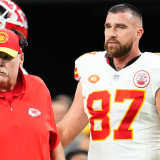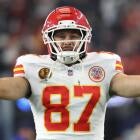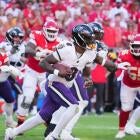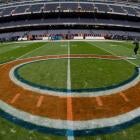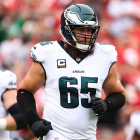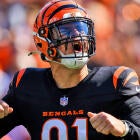2024 NFL Draft: If USC QB Caleb Williams doesn't want to play for certain NFL teams, there's a blueprint
Williams wouldn't be the first (or second) No. 1 pick to refuse to play for the team who drafted him

USC quarterback Caleb Williams has something most football players don't: leverage. He's currently the best quarterback in college, and in some seven-and-a-half months time, he's destined to be the No. 1 overall selection in the NFL Draft.
Typically, such things are celebrated. In part because of what the player has accomplished, and in part because the NFL is a 365-days-a-year show (the draft regularly draws more eyeballs than the NBA and NHL playoffs) where hope -- which typically comes in the form of a franchise quarterback -- is the one thing all fanbases, from Buffalo to Arizona, share.
But maybe it's the prospects of Williams landing in Arizona that prompted his father to speak out about his issues with the structure of the NFL Draft.
"The way the system is constructed, you go to the worst possible situation," Carl Williams told GQ.com. "The worst possible team, the worst organization in the league -- because of their desire for parity -- gets the first pick. So it's the gift and the curse. I mean, I've talked to Archie Manning -- his career was shot because he went to a horrible organization. I've talked to Lincoln [Riley], and Kyler [Murray] struggled because of where he was drafted. Baker [Mayfield] struggled mightily because of where he was drafted.
"The organizations matter. He's got two shots at the apple. So if there's not a good situation, the truth is, he can come back to school."
Carl Williams is right; the top graduating engineer or accountant or lawyer doesn't get relegated to the worst firm in the country. (Of course, this is the difference, in economic terms, between perfect competition and cartels, but that's a conversation for another time.)
It's also worth noting that Williams' father mentions Kyler Murray's struggles in part "because of where he was drafted."
Which brings me back to the Cardinals, who currently have two first-round picks and, according to Sportsline, have the worst odds (along with the Houston Texans) to win the Super Bowl. Put another way: they have the best odds to have the first-overall pick. The other team with the best odds to select No. 1? That would be the Houston Texans ... who traded that pick to the Cardinals for Will Anderson Jr.
So the Cardinals will get two bites at the apple for that top pick in the 2024 NFL Draft, which doubles the likelihood that Caleb Williams would not only be their next face of the franchise, but would be replacing the current face of the franchise, the aforementioned Murray.
So what is Williams' recourse?
He could enter the draft, and if he's selected by a team he has no interest in playing for, he could sit out the season. When an NFL team drafts a player, it holds his rights until the following year's draft. Williams would then re-enter the draft in 2025.
Alternatively -- and Williams has hinted at this -- he could just return to USC. In the NIL era, that certainly makes financial decisions easier; On3's valuation of Williams' NIL earnings for 2023 comes in at $2.6 million. It's a nice chunk of change, for sure, but Bryce Young, the 2023 first-overall pick, signed a four-year, $37.9 million contract, fully guaranteed.
That said, Williams still has the leverage, even if he'll only make a quarter of Young's $9.5 million average annual salary. I say that because there is precedent; in 1983, John Elway told the Baltimore Colts to not draft him (they did anyway), and 21 years later, Eli Manning told the San Diego Chargers the same thing (they, also, did anyway).
It's an easy leap to conclude that both Elway and Manning were better off with the Broncos and Giants, respectively.
Elway, who was drafted first overall by the Colts in April 1983 and was traded to the Broncos a week later, appeared in five Super Bowls, winning two of them. Meanwhile, in 2004, Manning, who was drafted No. 1 by the Chargers before being traded to the Giants, twice led New York to Lombardi Trophies.
Meanwhile, the Colts moved from Baltimore to Indianapolis before the 1984 season, averaged 4.8 wins from 1983-1986, lost in the playoffs after the '87 season and didn't make another playoff appearance until 1995. In that same span, Elway won three MVP awards, the Broncos won at least 10 games on five occasions, and made seven playoff appearances.
Manning only finished with a 117-117 regular season record, but he was a clinical 8-4 in the postseason, including 2-0 vs. Tom Brady's Patriots in the Super Bowl. The Chargers certainly made out better than the Colts above -- Drew Brees and Philip Rivers combined to get them to the playoffs seven times from 2004-2019. In fact, like Manning and the Giants, over that span the Chargers played in 12 postseason games. Unlike Manning and the Giants, however, the Chargers were 5-7, including a 1-3 record in the divisional round, and an 0-1 record in the conference championship game.
(Worth noting: the Colts did get their Lombardi; the team took Peyton Manning first-overall in 1998, and he led Indianapolis to a Super Bowl in 2006. Incidentally, he also led the Broncos to a title during his final NFL season in 2015.)
For more draft coverage, you can hear in-depth analysis twice a week on "With the First Pick" -- our year-round NFL Draft podcast with NFL Draft analyst Ryan Wilson and former Vikings general manager Rick Spielman. You can find "With the First Pick" wherever you get your podcasts: Apple Podcasts, Spotify, YouTube, etc. Listen to the latest episode below!
It gets worse when you look at the compensation, for both the Colts and Chargers. In 1983, the Colts sent Elway to Denver for guard Chris Hinton (the Broncos' No. 4 overall pick in '83), third-year quarterback Mark Hermann (a fourth-round pick in 1981) and a 1984 first-round pick (which became 19th-overall selection Ron Solt, also a guard).
In 2004, the Giants got Manning and the Chargers got Philip Rivers (the fourth pick in that draft), a 2004 third-rounder (they took kicker Nate Kaeding), a 2005 first-rounder (No. 12 selection Maryland pass rusher Shawne Merriman) and a 2005 fifth-rounder (Notre Dame tight end Jerome Collins).
By comparison, here's what the 49ers gave up before the 2021 NFL Draft to move up from No. 12 to No. 3 and select Trey Lance:
- The 2021 No. 12 pick became pass rusher Micah Parsons
- The 2022 first-round pick became guard Cole Strange (No. 29 overall)
- The 2022 third-round pick became linebacker Channing Tindall (No. 102 overall)
- The 2023 first-round pick became defensive tackle Bryan Bresee (No. 29 overall)
And this spring, this is what it cost the Panthers to go from No. 9 to No. 1, swapping places with the Bears, which allowed them to take Bryce Young:
- Traded wide receiver DJ Moore to the Bears
- The 2023 No. 9 pick became defensive tackle Jalen Carter
- The 2023 second-round pick became tight end Brenton Strange (No. 61 overall)
- A 2024 first-round pick
- A 2025 second-round pick
I talked about this on the "With the First Pick" podcast with our co-host, Rick Spielman, the former Vikings general manager with more than 30 years of experience. I asked him about the skyrocketing cost of doing business when trading up for a quarterback, and he had an interesting theory.
"[T]his next generation of GMs in the league, it used to be, 'OK, you're going to be there, so we've got to keep an eye on the now, but also look to the future,'" Spielman said. "And now it seems like [GMs] are working in the same timeframe or same window as head coaches. So they're doing everything they can and are in win-now mode. That's why I think you see a lot more aggressiveness and trades [in the draft] -- and giving up those draft picks because the front office is now as about as unstable as the coaching is.
"If you think Caleb Williams is a generational quarterback, which everybody is saying that he is, I can't imagine what the draft compensation for someone moving up trying to get him, especially if the team with the No. 1 overall pick is [probably] going to need a franchise quarterback anyway."
You can watch the entire segment below:
The idea of Williams writing his own ticket is an intriguing one, and may end up being more than just a thought experiment. What if the Raiders throw everything at landing him -- imagine a division with Patrick Mahomes, Justin Herbert and Williams. We'd be living in a world where Russell Wilson was QB4 and you'd be hard-pressed to find someone to disagree with you.
You'd also have to imagine the Rams and 49ers would be attractive West Coast destinations, and I have yet to meet a player who didn't want to play in South Beach. Then there are the Cowboys or maybe even the Patriots, where Williams would suddenly change the balance of power in division that has Josh Allen and Aaron Rodgers.
And while the Cardinals could conceivably be holding the short straw, Spielman does have some hypothetical good news.
"Let's say that next year, if you're the Arizona Cardinals, you can get a boatload [of picks to move out of the No. 1 spot], which they did already [in the Will Anderson Jr. trade]," he said. "So now let's say they moved down but are still in striking distance for Drake Maye [in the 2024 draft]. So you get a boatload of picks to go along with Maye -- that may be enticing as well."
As we sit here, the Cardinals have 11 picks in the 2024 NFL Draft -- five of their own, one each in Rounds 1-5 -- and a first, a third and a fifth-rounder from the Texans, a third-rounder from the Titans, and two more Day 3 picks from the Eagles and Giants.
Let's say the Cardinals end up with the No. 1 overall pick in the '24 draft and, say, a top-10 pick with their other first-rounder. They could land the type of draft-day payday that the 49ers or Panthers had to dole out, end up with three (or possibly even four) 2024 first-rounders, still be in position to draft Maye (or whomever quarterback they may have eyes for), as well as set the organization up to stockpile good young talent for the next 2-3 draft classes.
The hard part is figuring out who the franchise quarterback will be in a particular draft class; in 1983, six QBs were taken: John Elway (No. 1), Todd Blackledge (No. 7), Jim Kelly (No. 14), Tony Eason (No. 15), Ken O'Brien (No. 24) and Dan Marino (No. 27) were all first-round picks. Elway, Kelly and Marino are Hall of Famers, while Blackledge, Eason and O'Brien combined to go 93-96-1 in the regular season and 3-5 in the postseason with no Super Bowl rings among them.
Maybe the Colts' fate would've been a different one if they had taken Kelly or Marino instead of Elway. But "if" is doing a lot of work in the previous sentence because drafting Kelly or Marino assumes that finding a quarterback is easy. It is if you have a time machine. Otherwise, it remains more art than science.
And that brings us back to present day. If Maye balls out this fall, perhaps it's an easier pill to swallow, drafting the UNC quarterback and passing on Williams, should we get to that point. But you also don't want to be the head coach, general manager or owner who passes on the next Patrick Mahomes because he wasn't enamored with how you do business.
There's a ton to sort out between now and next spring and -- no surprise -- it starts with the most important position on the field. I'll give my podcast co-host, Rick Spielman, the last word:
"It'll be interesting to see how this all plays out. Again, the reason the league is so good, and why every fan of all 32 teams have optimism going into the season, is because of how everything is structured to try to make the NFL as equal as possible when we're talking about parity."


